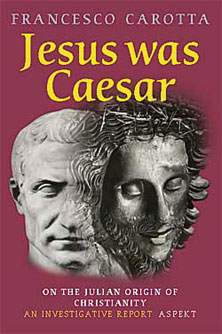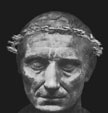Jesus was Caesar
On the Julian Origin of Christianity
– an investigative report –
PRO PEREGRINIS:
Français · Italiano · Español · Nederlands · Deutsch
Julius Caesar, son of Venus and founder of the Roman Empire, was elevated to the status of Imperial God, Divus Julius, after his violent death. The cult that surrounded him dissolved as Christianity surfaced.
A cult surrounding Jesus Christ, son of God and originator of Christianity, appeared during the second century. Early historians, however, never mentioned Jesus and even now there is no actual proof of his existence.
On the one hand, an actual historical figure missing his cult, on the other, a cult missing its actual historical figure: intriguing mirror images.
Is Jesus Christ really the historical manifestation of Divus Julius? Are the Gospels built on the life of Caesar, just as the first Christian churches were built on the foundations of antique temples?
Corruptions in the copying of texts, misinterpretations in translations—Gallia transposed to Galilaea or Caesar’s murderer, the conspirator (Cassius) Longinus, becoming the centurion Longinus stabbing Jesus on the cross—and the transformation of iconography from Roman to Christian have been traced to their origins: the Gospel proves to be the history of the Roman Civil War, a ‘mis-telling’ of the Life of Caesar—from the Rubicon to his assassination—mutated into the narrative of Jesus: from the Jordan to his crucifixion.
***
‘Your book, which I have studied against the backdrop of the sea, calm and then turbulent; under morning breezes and fresh nocturnal ones; and beneath the waxing moon of these past fifteen days of vacation,
has been like an (anti-)revelation to me, with the description of the hidden side (or the reverse) of an entire epoch, which I hardly suspected was there.’
– a reader –
‘This report is of the same order of importance as the scientific discoveries of Darwin and Galileo… Carotta’s discovery will turn the entire history of civilization upside down.’
– Paul Cliteur, Ph.D., (CV, pub.) Dutch Television –
‘ ‘The reader can experience all this step by step, because the bulk of the book in question consists simply of the report of this investigation. There is no need to rely on conclusions; the genesis of these conclusions can be verified very precisely. Well, of course you should not expect otherwise from a scientific publication, but the actual practice shows that of all specialists those who research Jesus always tumble into the pitfalls of their prejudices.’
– Peter Veldhuisen, Het Parool –
‘Does the passion story have its origins in a misunderstood version of a Vita Caesaris on the last days of this dictator and high priest of Rome, who was also known for his clemency and who was celebrated as a benefactor of the people? That sounds like an absolute nonsense. However, Carotta substantiates this theory with numerous proofs.’
– Thomas von der Dunk, Ph.D., (CV, pub.) Vrij Nederland
[ review of T. H. v. d. Dunk in English translation ]–
‘Reading the overwhelming amount of material Carotta provides to support his thesis, it has to be admitted that he is not skating on thin ice. In my opinion this book presents us with the key to unlocking a lot of mysteries on the spread of Christianity in the Roman Empire.’
– Paul Cliteur, Ph.D., (CV, pub.) De Humanist –
‘The Christian mystery has been unlocked, the code of the New Testament has been cracked.’
– die tageszeitung, Berlin –
‘I think this book provides us with a new opening to the research on the accounts of Jesus’ life, an extremely important one…
To me this is the book of the year.’
– Andreas Kinneging, Ph.D., (CV, pub.) Dutch Radio –
‘But perhaps Jesus has very well existed historically. In the person of Julius Caesar. And the life narrative of Jesus as it is told to us in the Gospel is simply that of Julius Caesar.’
– Bert van Nieuwenhuizen, Utrechts Nieuwsblad / GPD –
‘When Francesco Carotta asks if Julius Caesar and Jesus Christ are the same person, a question which is rhetorical to him, he participates in the development of normative future models which the elite of church and state considers undesirable, but for the average citizen who wants to explore his own future himself, this is experienced as inspirational.’
– W.J. de Ridder, Ph.D., (CV, pub.) Inaugural Address
Faculty of Future Studies, University of Twente –
‘Carotta writes with respect for his subject, even with religious discretion, with witty irony but also with poetry. Even if one cannot or will not follow the author’s conclusions, one learns much about Roman religiousness, which became the basis of the development of the Christian faith in the European cultural environment.’
– Rev. Stephan Ch. Kessler S J, Dr. theol., (CV, pub.)
advisory report for ORF (Vienna) –
‘A book with a perspective on the European heritage that will remain indelibly printed in your memory.’
– Willem Dijkhuis, Het Financieele Dagblad –
[echo]
***


